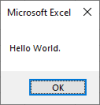Greeting all! I am trying to determine if there is a method to call a stored macro (excel) from a program? From what I have read, I could use the code from the macro and embed it into the .p / .w, but some of the sheets I work with will change and it is just easier to modify the macro then try and put it into the code. (Long story on the reason why.) Maybe emulate key-strokes? I open for suggestions and thanks for readying. -Dennis-
Macros, run an Excel macro from 4GL
- Thread starter wa4qms
- Start date
Similar threads
- Locked
- Szabó László
- Stackoverflow tagged OpenEdge or Progress-4GL/DB
- Locked
- Jessica Malakian
- Progress Blog
- Locked
- Anita Kyurova
- Progress Blog
- Locked
- David Kaaret
- Progress Blog

